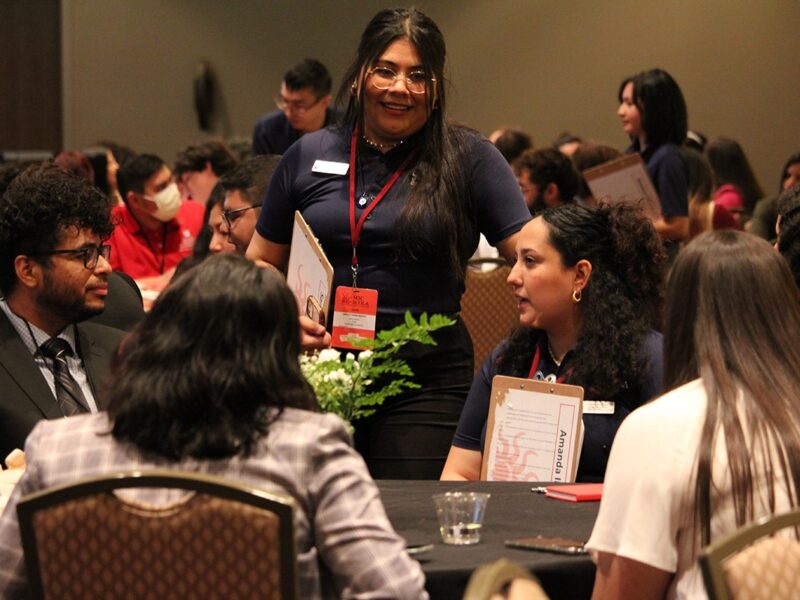Quaintly Quince
Well-Dressed British History Professor Earns Respect From Students and Colleagues Nattily dressed man.
This best describes what you would see if you spied professor Ralph James Quincy Adams walking across campus at Texas A&M University.
His curled mustache, straw-colored hair and neatly tailored suit complete with pocket handkerchief make him stand out in a crowd of T-shirts, flip-flops and baseball caps. Adams says the wardrobe results from decades of travel to and from England.
Called “Quince” by his friends, Adams remains passionate about his 35-year career as a British historian … maybe because it’s a life he never imagined.
“I didn’t go to a university to be what I am,” said Adams, who grew up in Indiana. “But I had a brilliant teacher in professor Leo F. Solt at Indiana University—a wonderful teacher—and pretty soon, I was absolutely, passionately in love with the subject.”
It’s a love that has carried Adams to an elite status. Notable historians on both sides of the Atlantic classify Adams, promoted to distinguished professor this spring, as one of the most astute historians of early 20th century Britain.
World War Analyses
He first caught his peers’ attention by rejecting the notion that Britain succeeded in World War I using methods from 19th century victories. Adams argued that Britain produced the necessary war materials and manpower by centralizing control of labor, resources (such as armaments), and the economy, and by instituting a draft.
Adams also challenged the way historians viewed the British policy of appeasement toward Adolf Hitler’s Third Reich during the late 1930s. The prevailing view painted Prime Minister Neville Chamberlain and others as weak leaders who caved in to Hitler’s demands. Adams’ research demonstrated appeasement was a reasonable policy for that time because of Britain’s military limitations and the responsibilities throughout its empire. Adams concluded Chamberlain and others simply made a terrible mistake in dealings with Hitler.
In the late 1990s, Adams changed his writing focus to historical biography with a particular interest in people he believed had been misinterpreted by historians. His first subjects were Andrew Bonar Law (1858–1923) and Arthur James Balfour (1848–1930), both of whom served as prime minister.
“Andrew Bonar Law was a businessman who moved into politics,” Adams said. “He was a very nondescript man who lived in an incredible time and had an incredible career. Balfour was a brilliant original. There aren’t half a dozen people like him in my whole area of history. He’s just sort of a bird of paradise among the house wrens.”
Adams wondered whether the Balfour book might stir controversy because of a section about the Balfour Declaration, which in essence gave the green light to create the state of Israel in 1948. Instead of controversy, he said, reviewers on both sides of the issue seemed to think his coverage was fair.
Adams’ latest project is part biography, part period piece. Scheduled to be published in 2010, it covers the Georgian period, which Adams said few historians find interesting.
“King George becomes monarch in 1910 and dies in 1936. And look what happens in that time: You’ve got the lead-up to the Great War and the war itself, the aftermath and the rebuilding of Europe, then the world depression, the lead-up to World War II. All this happens in the lifetime of this quite ordinary, nice man, who happens to be the king of England.
“I’m using him and his reign as a kind of magnet to pull all this stuff together. I’m going to look at several individuals from politics and the arts, popular culture and all to use them as illustrations for this remarkable age. Of course, it involves America, too, because by then you’ve got a trans-Atlantic culture.”
Graduate Seminar Interrupted
In 2001, Adams’ growing reputation earned him the Claudius M. Easley Jr. Fellowship in Liberal Arts. The fellowship was especially rewarding because he met the donor, Claudius M. “Sandy” Easley Jr. Three years later, Adams received the Patricia and Bookman Peters Professorship in History, which was established in 1991 through the Texas A&M Foundation.
“I was teaching my graduate seminar,” Adams said, “and one of the things that is just not done is to interrupt a graduate seminar, unless there is a fire. We had just gotten into this discussion. We’re going at it, and somebody knocks on the door. And I thought, ‘For goodness’ sake, what can this be?’ And I open the door and here’s Charlie Johnson, the dean, and Walter Buenger, our department head, and Bookman. All of these guys marched in, and you could’ve knocked me over with a feather. It was just a very sweet moment. Then they clear out and I was supposed to get back to business!
“One of my students said, ‘This is good, isn’t it?’ I said, ‘Yes, this is very good!’ The Peterses created the endowed history professorship with a $150,000 donation. It is awarded to distinguished scholars of governmental policy or public leadership whose research and teaching have an international dimension.”
No Place Like Home
Even though Adams annually journeys “across the pond,” Bryan/College Station is home. In a 2007 interview with The Battalion, Adams said, “I’ve watched it grow and been a part of it. When I first came here, people going from Bryan to College Station would drive through the campus. It was another world. This is an amazing place. And in my case, having come here as a young man 35 years ago, I’m a part of that organic mix.”
Bookman Peters ’59 also calls Bryan/College Station home. Peters is a fourth-generation resident of Brazos County who enjoyed a successful banking career. He and his four daughters earned degrees from Texas A&M.
Peters has demonstrated his gratitude by giving back to Texas A&M in several areas. “My education and career were in the business world, which I cherish, but I have always felt that knowledge of history gives a person perspective and an appreciation for the challenges that were faced during the journey to the present,” Peters said. “Also, our family has been fortunate to have had very good personal friends in the history department over the years.”
One of those friends is Adams, whom he met at a party more than two decades ago. Peters said Adams’ appointment to the professorship has only enhanced the relationship. “We are very pleased that Quince was chosen for our professorship, which facilitated the growth in our friendship,” Peters said. “He has graciously taken steps to make us feel a part of his teaching, research and writing, which is very meaningful to us.”
Adams is quick to credit Peters’ personality for the growing camaraderie. “It’s refreshing to meet people outside the academic world who are just interested in ideas and data and things,” Adams said. “He’s like that. Bookman is just easy to talk to, easy to spend time with. He puts anyone at ease, therefore it’s very easy to be grateful to somebody like that.”
These days Adams has another reason to appreciate Peters: The Florence and Bookman Peters ’59 Excellence Fund, established in 2006 through the Foundation, supports a doctoral student working with the faculty member who holds the Peters Professorship. Adams said the fund was crucial in recruiting Aaron Linderman, a University of Dallas graduate in the first year of his Ph.D. program at Texas A&M. “As any graduate student knows, the funding matters,” Linderman said.
“Tuition, a teaching assistantship, a moving stipend and the Peters Fellowship: in all, it was an impressive package. Moreover, I heard from a variety of faculty and staff that good funding made A&M an enjoyable place to study and work.”
Linderman has discovered that Adams is as passionate about mentoring his graduate students as he is about his research. In his first class with Adams, Linderman took his professor’s advice and presented a research paper he had written for class at a Philadelphia conference.
“One of the things I tell them is if you don’t love this, you’re not going to be as good as you might be,” Adams said. “Why would you put up with the sacrifice and the work to do something like learn how to be a historian or learn how to be an academic? I was lucky in that I found what I wanted to do and I get to do it. It didn’t have to be that way.”
And he is grateful.
“My message to those who support academics through the Texas A&M Foundation—and I speak to you from the absolute bottom of my heart—is that these professorships, chairs and graduate fellowships really matter,” Adams said. “They’re not just rewards. They’re investments.”
Media contact: tamunews@tamu.edu.





